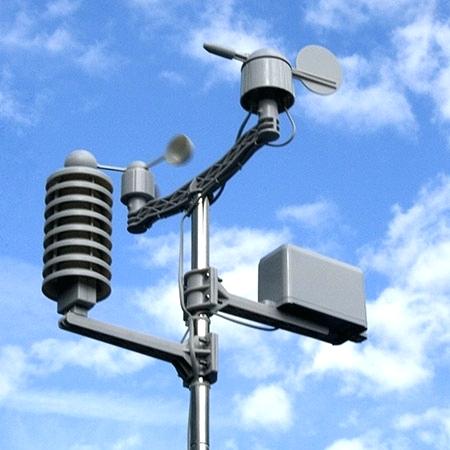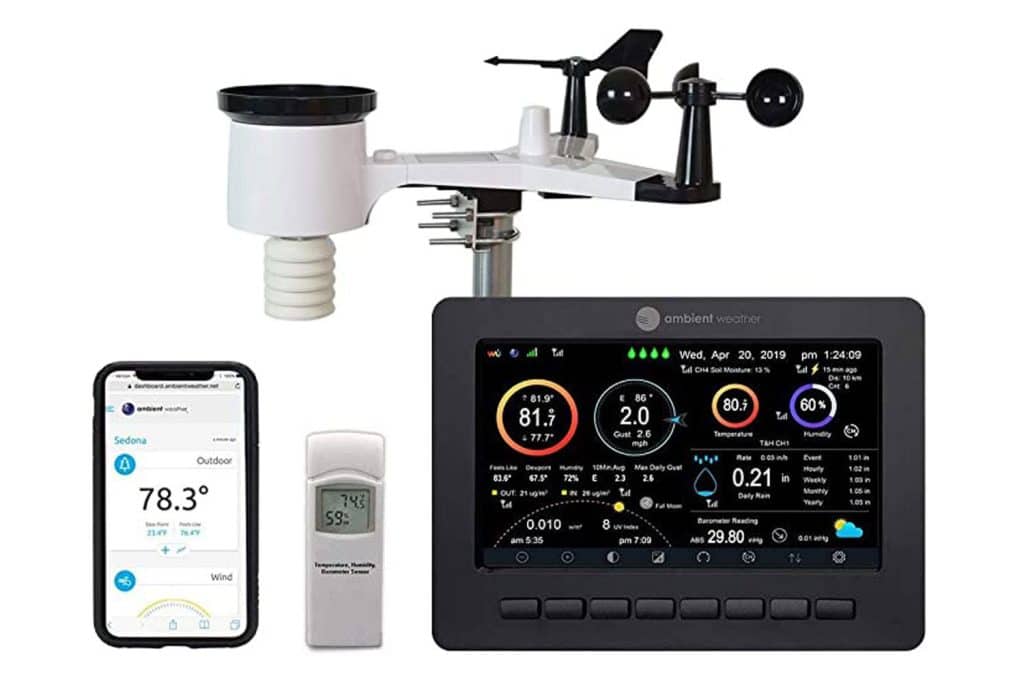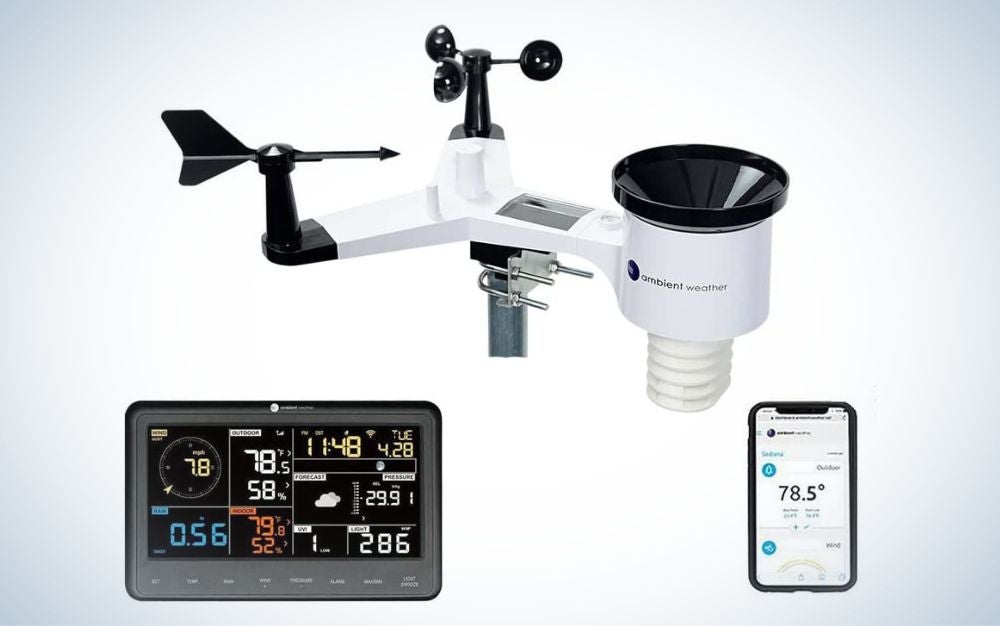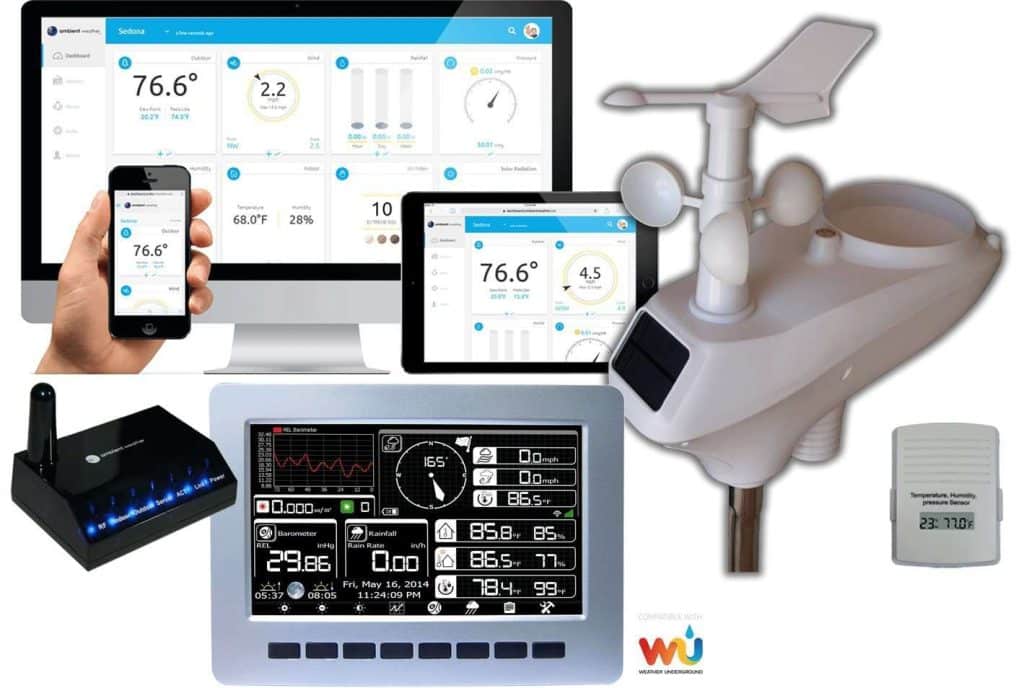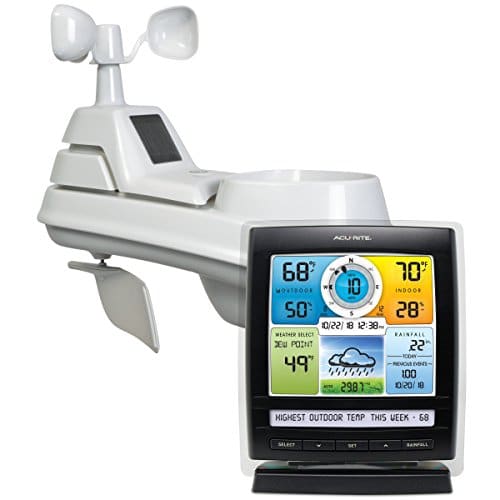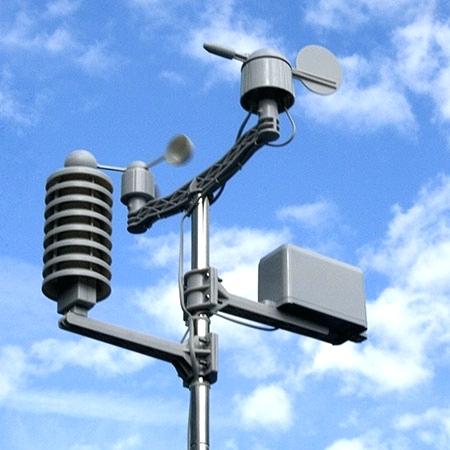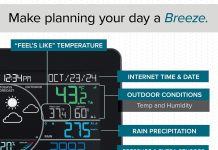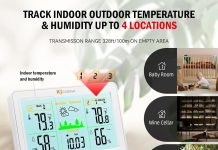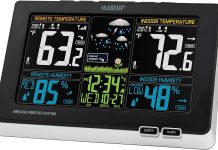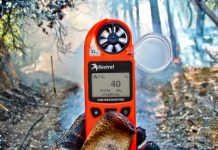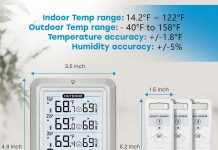Curiosity about the ever-changing climate and its impact on our day-to-day lives is something that unites us all. It’s no wonder why many people, like us, are turning to home weather stations to explore and understand the weather patterns in their own backyard. These clever devices offer real-time data, allowing us to anticipate upcoming conditions, plan outdoor activities, and even make informed decisions about our health and well-being. With the power to transform our homes into meteorological observatories, home weather stations provide a fascinating and practical way to connect with the atmospheric wonders that surround us.
This image is property of www.thespruce.com.
Review contents
Accurate and Personalized Weather Data
Real-time Updates
With a home weather station, we can have access to real-time weather updates right in the comfort of our own homes. Instead of relying on generic weather forecasts from news channels or websites, we can have accurate and up-to-date information tailored specifically to our location. This means we can plan our day accordingly, whether it’s deciding on outdoor activities or simply knowing what to wear before stepping outside.
Localized Information
One of the major advantages of owning a home weather station is the ability to obtain localized weather information. Traditional weather forecasts often provide general data for larger regions, but microclimates within those areas can have vastly different weather patterns. By having our own weather station, we can collect data directly from our own backyard, providing us with a more accurate representation of the weather conditions where we live.
Microclimates
Microclimates refer to small-scale areas with unique weather conditions within a larger region. These variations can be caused by factors such as topography, vegetation, or proximity to bodies of water. Having a home weather station allows us to monitor and track microclimates, providing valuable insights and helping us make more informed decisions. For example, we can adjust our gardening practices based on microclimate data, ensuring our plants thrive in their specific environment.
Weather Monitoring and Forecasting
Advanced Sensors
Home weather stations are equipped with advanced sensors that capture various weather measurements. These sensors can detect and record data on temperature, humidity, air pressure, wind speed, and wind direction. With this comprehensive set of information, we can monitor the current weather conditions and track changes over time. These accurate measurements serve as a basis for generating precise forecasts using sophisticated algorithms.
Precipitation Tracking
Knowing when and how much precipitation is expected is crucial for a variety of reasons. Whether we want to plan outdoor activities, assess the need for watering our garden, or prepare for potential flood risks, accurate precipitation tracking is essential. Home weather stations can provide us with precise data on rainfall and snowfall, enabling us to make informed decisions and take appropriate actions based on the local conditions.
Extreme Weather Alerts
In regions prone to extreme weather events like hurricanes, tornadoes, or severe storms, having early warning systems can be a matter of life and death. Home weather stations can be equipped with features that detect these extreme weather conditions and issue alerts. This allows us to take necessary precautions, such as seeking shelter or evacuating, well in advance to ensure the safety of ourselves and our loved ones.
This image is property of www.popsci.com.
Gardening and Outdoor Activities
Optimal Planting and Harvesting
Gardening enthusiasts can greatly benefit from having a home weather station. By monitoring the temperature, humidity, and rainfall levels, we can determine the optimal time for planting various crops and flowers. Additionally, we can plan our harvests based on weather patterns, ensuring that our fruits and vegetables are picked at their prime. This personalized information helps us maximize the productivity and success of our garden.
Watering and Irrigation
One of the key factors in maintaining a healthy garden is proper watering. By monitoring soil moisture levels through our home weather station, we can accurately assess when to water our plants, avoiding both under-watering and over-watering. Additionally, some advanced weather stations can even provide recommendations on the amount of water needed for different plants, ensuring efficient and effective irrigation practices.
Outdoor Event Planning
Planning an outdoor event can be challenging, especially when it comes to the weather. A sudden rainstorm can ruin a picnic or a wedding ceremony. With a home weather station, we can keep a close eye on the forecast and make informed decisions about scheduling our outdoor events. We can confidently plan activities such as backyard barbecues, sports tournaments, or garden parties, knowing that we have access to accurate and personalized weather information.
Energy Efficiency and HVAC Optimization
Climate Control Optimization
Having a home weather station can greatly enhance the efficiency of our heating, ventilation, and air conditioning (HVAC) systems. By monitoring the temperature and humidity levels inside and outside our homes, we can make informed decisions about when to adjust the thermostat settings, open windows for natural ventilation, or use fans to circulate air. This optimization can lead to significant energy savings and a more comfortable living environment.
Reduced Energy Consumption
By utilizing the data provided by our home weather station, we can identify trends and patterns in our energy consumption. For example, we can correlate energy usage with outdoor temperature, allowing us to create more energy-efficient schedules and make adjustments to reduce wasteful consumption. With this information, we can take proactive steps towards reducing our carbon footprint and saving money on our energy bills.
Cost Savings
Optimizing our energy usage not only helps the environment but also has a direct impact on our wallets. By reducing unnecessary energy consumption, we can lower our monthly utility bills. Additionally, by understanding our local weather patterns and adjusting our HVAC systems accordingly, we can avoid unnecessary strain on our equipment, potentially extending their lifespan and reducing maintenance and replacement costs.
This image is property of www.lifewire.com.
Home Safety and Damage Prevention
Storm Detection
Storms can cause significant damage to our homes, property, and even endanger our lives. With a home weather station, we can receive timely alerts and warnings about approaching storms, enabling us to take necessary precautions. By being aware of the severity and trajectory of storms, we can secure outdoor furniture, reinforce windows and doors, and prepare emergency supplies in advance, minimizing the risk of damage and ensuring our safety.
Fire and Smoke Monitoring
In addition to weather monitoring, many home weather stations offer additional sensors for fire and smoke detection. These sensors can provide early warning signs of potential fires, allowing us to respond quickly and effectively. By receiving alerts and taking immediate action, we can potentially prevent minor incidents from escalating into major emergencies, safeguarding our homes and the safety of our loved ones.
Flood and Leak Warning
Water damage due to floods or leaks can be costly and inconvenient. With our own home weather station, we can monitor rainfall levels and detect any sudden changes that may indicate a potential flood risk. Additionally, some weather stations can be coupled with moisture sensors that detect leaks in our homes, alerting us before extensive damage occurs. By staying vigilant and proactive, we can prevent water-related disasters and save ourselves from unnecessary expenses.
Educational and Hobbyist Purposes
Learning Opportunities
Having a home weather station provides endless learning opportunities for individuals of all ages. We can explore the scientific principles behind weather phenomena, such as how temperature affects air pressure or how wind patterns are formed. By observing and analyzing the data collected by our weather station, we can gain a deeper understanding of the weather and its impact on our daily lives.
Data Analysis
The wealth of data collected by home weather stations can be used for data analysis projects, whether for personal curiosity or educational purposes. By analyzing the trends and patterns in the weather data, we can draw meaningful conclusions and even make predictions about future weather patterns. This hands-on approach to data analysis can foster critical thinking skills and a deeper appreciation for the scientific method.
Citizen Science Contributions
Home weather stations can also contribute to citizen science efforts. By sharing our weather data with larger networks or organizations, we can contribute to ongoing scientific research and help improve weather forecasting models. This collective data provides scientists with valuable insights into localized weather patterns, enabling them to refine their models and enhance the accuracy of weather forecasts on a larger scale.
This image is property of Amazon.com.
Insurance and Documentation
Proof of Weather Conditions
In situations where weather conditions play a significant role, such as car accidents or property damage claims, having accurate and personalized weather data can serve as valuable proof. Insurance companies can rely on the data collected by our home weather stations to assess the claim and validate the weather-related circumstances. This transparency and accuracy help expedite the claims process, ensuring fair and accurate settlements.
Claim Verification
Accuracy and trustworthiness are crucial when it comes to insurance claims. Home weather stations provide an added layer of verification, allowing insurance companies to cross-reference their own data with the weather data collected by homeowners. This verification process helps prevent fraudulent claims and ensures that only valid claims are processed, maintaining the integrity of the insurance industry.
Property Records
The weather data collected by our home weather stations can also serve as valuable property records. For example, historical weather data can be useful when selling a home, as potential buyers can gain insights into the property’s climate and weather patterns. Additionally, property owners can use this data to evaluate the long-term effects of weather conditions on their homes, which can be valuable for maintenance and renovation decisions.
Planning for Outdoor Recreation
Hiking and Camping
Outdoor enthusiasts can benefit greatly from having a home weather station when planning hiking or camping trips. By checking the weather conditions of our desired hiking or camping location, we can prepare accordingly by packing appropriate clothing and gear. Additionally, we can track real-time weather updates during our excursion, allowing us to make informed decisions about safety or even change our route if severe weather is approaching.
Fishing and Hunting
Knowing the weather conditions is essential when it comes to fishing and hunting. Fish are more active during certain weather patterns, and wildlife behavior can be influenced by weather factors such as temperature or wind direction. By consulting our home weather station, we can increase our chances of a successful fishing or hunting trip by selecting the best time and location based on localized weather conditions.
Snow and Ski Activities
For winter sports enthusiasts, accurate weather information is key to planning snow and ski activities. Home weather stations can provide us with data on snowfall accumulation, temperature, wind speed, and other factors that affect snow conditions. This information helps us determine the best time and location for hitting the slopes, ensuring an enjoyable and safe experience.
This image is property of www.architecturelab.net.
Community and Neighborhood Awareness
Shared Data Networks
Many home weather station owners contribute their data to shared networks, creating a wealth of information that benefits the entire community. By participating in these networks, we can gain access to data from other stations in our area, providing a more comprehensive understanding of localized weather patterns. This shared data fosters a sense of community and allows us to better support and assist our neighbors during weather-related events.
Weather Updates for Others
By sharing our home weather station data with others, we can help keep our neighbors informed about the local weather conditions. This can be particularly useful during severe weather events, as it allows the community to take necessary precautions and stay safe. Whether through online platforms or local community groups, providing weather updates for others demonstrates the power of technology in fostering community resilience.
Community Emergency Preparedness
Community emergency preparedness relies heavily on accurate and timely weather information. By having a network of home weather stations within a community, emergency response teams can access localized data for better situational awareness. This information enhances their ability to make informed decisions, allocate resources effectively, and provide timely warnings to community members. Together, we can build a more resilient and prepared community.
Tracking Climate Change and Weather Patterns
Historical Data Analysis
Home weather stations play a valuable role in tracking long-term climate change and weather patterns. By collecting and analyzing historical weather data, scientists and researchers can discern trends and patterns that inform our understanding of climate change. Homeowners who contribute their data to larger research projects enable scientists to study localized climate variations and their impact on regional and global climate systems.
Temperature and Rainfall Trends
The comprehensive weather data collected by home weather stations provides valuable information about temperature and rainfall trends over time. By analyzing this data, researchers can gain insights into climate change, such as the gradual increase in average temperatures or shifts in precipitation patterns. This information helps us better anticipate and prepare for the impacts of climate change in our area.
Contributing to Research
Every data point collected by home weather stations contributes to a larger pool of information for climate research. By owning a home weather station and sharing our data, we can actively participate in the scientific endeavor to better understand our planet’s climate system. Our contributions, no matter how small, collectively advance our knowledge of climate change, making a positive impact on future generations.
In conclusion, owning a home weather station provides us with accurate and personalized weather data that is tailored to our specific location. From real-time updates to alerts for extreme weather events, these devices offer valuable information that helps us make informed decisions about outdoor activities, energy efficiency, home safety, and more. Additionally, home weather stations provide educational opportunities, contribute citizen science, and even play a role in insurance claims and property records. By leveraging the power of technology, we can enhance our understanding of weather patterns, contribute to climate research, promote community resilience, and live more informed lives. So, why would we want a home weather station? The benefits are abundant, from practicality and safety to environmental stewardship and personal growth. It’s time to bring the weather home.

